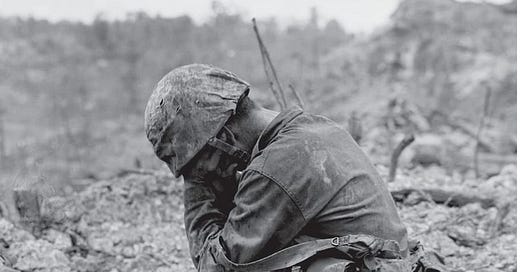For those of you who are newer to Kedits, I occasionally send out book recommendations. At Bookshop, I have my own affiliate site (Kedits Reads) in which I maintain bookshelves of my favorite nonfiction. I’m working my way through recommendations for them all. If you buy from my bookshop I get a commission, but whatever store or libary suits you, suits me.
I’ve previously reviewed:
Janesville, the story of a GM factory closing in Wisconsin during the Great Recession,
Blood in the Water, the de factor account of the Attica prison uprising and its brutal conclusion, and
The Senator and the Sharecropper, a biography of Fannie Lou Hamer and the powerful Segregationist senator from the same county in Mississippi.
This time, a real hard look at the source for so much American nostalgia.
From the shelf: American Myths
Book: Myth and the Greatest Generation
The Greatest Generation was the moniker given to the Americans who spent their early years in the Great Depression and came of age to fight in World War II. The name was given to them in the late 90s by Tom Brokaw in a book of the same name, when many if not most of them were long dead.
Rose is a social historian; this work isn’t a take down so much as a setting the record straight. Their circumstances were incredible, but members of the Greatest Generation were just as human as the rest of us. The men fought in World War II and deserted at high rates. The women maintained the home front and worked in factories and often neglected their children, had affairs, abortions, and divorces. This wasn’t a period of racial or social harmony; there were race riots and labor riots.
Myth relies mainly on contemporary accounts to illustrate just how much more nuance and humanity this generation had at the moment that our nostalgia erases.
To get a sense for this, think of movies. I’ve probably seen 50 movies that take place during World War II, from the Dad Movies of the 1960s like Great Escape and Longest Day, to the Hollywood World War II machine that really took off in the 1990s. But none of them have the tone or nuance of The Best Years of Our Lives, which was released in 1946. It’s about three veterans returning home who struggle to adjust to ‘normal lives.’ They are supposed to be happy but aren’t. I would wager it is probably one of the first screen portrayals of post traumatic stress, or the difficulty of having sex when you are disabled.
I recommend Myth for two reasons. One is that it delivers one jaw dropping fact one after another that keeps the read easy. I don’t want to spoil too much but as an example, I distinctly remember gasping aloud when I read the District Attorney of San Francisco say that there were more abortions than live births in the city in the prior year.
[[SIDE BAR: Yo why isn’t that a movie? That quote is taken from the section of the book that talks about the home front—which was a marital disaster—and the explosion in abortion rings during the war. Given the numbers cited at the time this could be the peak of abortion in the US. My mind was blown! Hollywood, be better.]]
The second reason is that I appreciate so much a book that becomes part of my permanent perspective. Americans are devoted to a past that doesn’t exist; we hold today to a standard that was never met. It has been five or six years since I first read this book and yet I think of it so often.
This mythologizing, it holds us back. You can’t believe that the future will be better if you’ve been fooled into thinking that the past was the best.
PS. Here’s the video review.






I read Janesville and the Myth book on your recommendation and am very glad I did. They gave insight I didn’t have. Thank you!
Dr. Edwards, speaking of book recommendations: are you familiar with Peter Turchin's work? He is using data science to come to very similar conclusions as yours. I've only just begun his book End Times, but I highly recommend it!